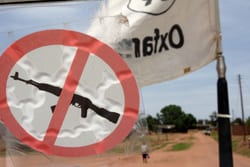Recent events in the Middle East and North Africa demonstrate the tragic impact of the unregulated arms trade and the urgent need for a strong Arms Trade Treaty, said a coalition of non-governmental organisations ahead of crucial talks in New York this week. A global deal on arms trade, the group says, would prevent irresponsible arms transfers that cost so many innocent lives and fuel internal conflicts such as in Syria.
Recent events in the Middle East and North Africa demonstrate the tragic impact of the unregulated arms trade and the urgent need for a strong Arms Trade Treaty, said a coalition of non-governmental organisations ahead of crucial talks in New York this week. A global deal on arms trade, the group says, would prevent irresponsible arms transfers that cost so many innocent lives and fuel internal conflicts such as in Syria.
 |
| Oxfam is demanding governments toughen up controls on the arms trade and introduce an international Arms Trade Treaty. |
Diplomats are meeting in New York this week for a final round of preparatory talks on the global Arms Trade Treaty (ATT), which will be finally negotiated in July. There is currently no global regulation on the conventional arms trade, making it too easy for arms to end up in the hands of human rights abusers.
“Sadly, there are too many imploding countries right now that point to the need for a strong Arms Trade Treaty. It is also deplorable that Russia argues it is responsible to continue sending weapons to a regime that is bombarding its citizens,” said Jeff Abramson, Coordinator of the Control Arms Coalition.
“A strong ATT with robust human rights criteria would make clear that arms transfers must not occur when there is a substantial risk of them being used to kill civilians and commit human rights abuses. The sale of any arms to Syria right now is simply appalling.”
This week’s meetings will focus largely on the rules of procedure for the July negotiations, including whether to take a text that countries have vigorously negotiated over the last two years or to start from scratch. Some states such as Pakistan and China are now pushing to ignore the Chair’s text as a real basis of negotiations, and instead, begin drafting a complicated international legal agreement in a few days in July.
“States have an historic opportunity to help save lives by bringing the deadly arms trade under control,” added Abramson. “The recent case of Viktor Bout points to the reality that arms dealers have the luxury to operate in a legal vacuum and run their deadly trade with complete impunity. This must come to an end, and the process of the Arms Trade Treaty is our best way to tackle this problem.”
More than 100 civil society participants from all continents will attend the talks as part of the Control Arms coalition, which was recently nominated for the 2012 Nobel Peace Prize. The delegation includes Nobel laureates, parliamentarians, armed violence survivors, lawyers, activists, policy experts and health professionals.



